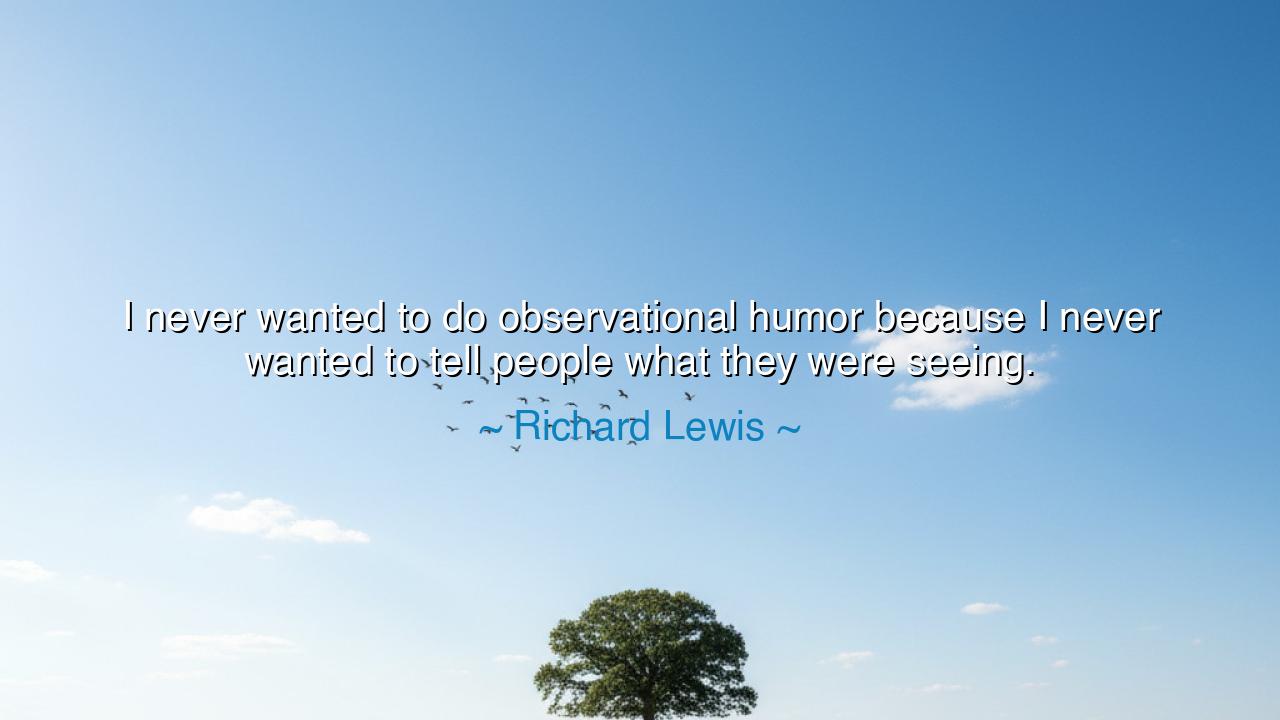
I never wanted to do observational humor because I never wanted
I never wanted to do observational humor because I never wanted to tell people what they were seeing.






In the grand theater of existence, where words are both weapons and tools of connection, there are those who speak not just to inform but to illuminate the deeper truths of life. Richard Lewis, a master of comedy and introspection, once shared a thought that resonates with profound depth: "I never wanted to do observational humor because I never wanted to tell people what they were seeing." In these words lies an understanding that transcends the ordinary, inviting us to think not just about what we see, but how we perceive the world. Observational humor, a genre where the comedian reflects on the familiar, telling the audience what they already know, can be a powerful force, yet Lewis reveals that there is a more subtle, more profound way of engaging with the world—one that doesn’t dictate the truth, but invites reflection and discovery.
The ancients recognized the importance of perception and understanding in shaping human experience. In Plato’s Allegory of the Cave, the philosopher presents a vivid image of prisoners bound in a cave, watching shadows on the wall, unaware of the world beyond. It is not until one of them escapes and sees the world in its true form that the full scope of reality becomes clear. Lewis, much like the freed prisoner, understands that comedy, when it is reduced to observing the surface of things, fails to explore the deeper essence of human existence. Observational humor, by its nature, tells us what we already see; it doesn’t invite us to look deeper, to question, or to understand the complexity of the world. Lewis’s reluctance to engage in such humor speaks to the desire to elevate comedy beyond the obvious, to move toward something more profound, where the audience must do the work of discovery themselves.
Consider the wisdom of Aristotle, who taught that the highest form of art is one that stirs the soul, encouraging the audience to reflect on their own lives. Aristotle believed that tragedy—the most elevated form of dramatic art—should not simply provide answers or explanations, but should engage the audience in a process of self-examination. Similarly, Lewis’s comedy seeks not to explain the world to the audience but to invite them into a space where they are encouraged to reflect on their own perceptions and experiences. Humor, in this way, becomes a mirror—something that reflects the complexities of life without imposing a fixed interpretation. Lewis understands that true comedy comes not from telling people what they already know, but from allowing them to discover something new, something that challenges their understanding of the world.
The idea that comedy should not simply reflect the obvious but should delve deeper into the complexities of life is reflected in the life and work of Charlie Chaplin, one of the most iconic figures in the history of comedy. Chaplin was known for his silent films, where the humor was not simply based on what the audience could see, but on the way in which Chaplin’s character, the Tramp, interacted with the world. The Tramp did not explain what was happening; instead, he made the audience feel the irony, the absurdity, and the sorrow of life in a way that invited them to reflect on their own experiences. Chaplin’s humor was not about telling the audience what they were seeing, but about showing them the deeper human condition—a reflection of Lewis’s own desire to move beyond the superficial and to engage with something more authentic.
To understand Lewis’s reluctance to do observational humor, we must see it through the lens of authenticity. Comedy that merely points out the obvious risks becoming superficial, trapping both the comedian and the audience in a cycle of repetition. In contrast, humor that encourages reflection and engagement—that invites the audience to draw their own conclusions—creates a deeper, more lasting connection. In the same way that Socrates would use questions to provoke thought and reflection in his students, Lewis’s humor becomes a tool not just for entertainment, but for deeper introspection. It is a challenge to the audience to see the world not just through their immediate perceptions, but through the lens of the complex and the nuanced.
The lesson here is simple yet profound. In a world where so much of life is explained to us, where the familiar is often taken for granted and the surface is all we see, we must learn to look deeper. Humor—and life itself—is not simply about accepting what we are told but about questioning and discovering what lies beneath the surface. Like Lewis, we must challenge ourselves and others to engage with the world in a way that goes beyond the obvious, that doesn’t simply tell us what we already know, but invites us to explore the complexity of our own perceptions. It is through this discovery that we find truth, not as something handed down to us, but as something we uncover together.
Let us take Lewis’s words into our own lives. Whether in our daily conversations, our work, or our art, let us strive to avoid the temptation to simply present the obvious or the expected. Let us encourage reflection, provoke curiosity, and offer space for others to engage with the world in their own way. Humor, like life, is not merely about entertaining or explaining; it is about creating a moment of connection, where we can step back from the surface of things and see the world anew. Through this, we will cultivate a deeper understanding, not just of the world around us, but of ourselves and those with whom we share this journey.






AAdministratorAdministrator
Welcome, honored guests. Please leave a comment, we will respond soon